@AngelicRampage:I don't want my balls blown off. By anything. Especially not Duke Nukem.
alex's forum posts
Strauss Zelnick is, by all accounts, a pretty nice guy, especially as CEOs of major corporations go. But if it's one thing a steady diet of spy fiction and The Simpsons has taught me, it's that the nicest CEOs are usually the ones with secret plans for world domination and/or destruction.
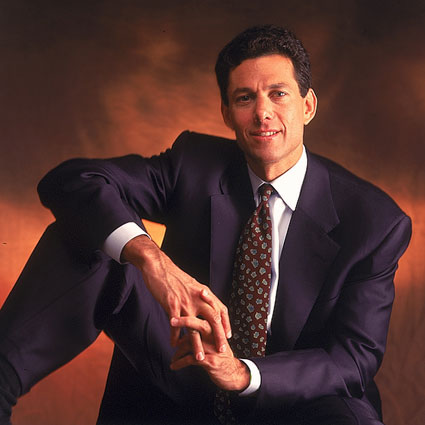
Based on Zelnick's interview with Forbes today, it sounds like the next step in his plan to go all Hank Scorpio on the world is to move forward with new entries in the Duke Nukem franchise. When asked about future plans for the Duke Nukem IP, including any possibilities for film and TV off-shoots, Zelnick was quick to shoot down any immediate plans for other media, but did leave the lingering threat of future games wide open by saying, "We don’t really talk about it in detail but you will see future Duke IP coming from this company."
If that didn't just send shivers down your spine, I don't know what will.
Duke Nukem Forever has evidently been a financial success for the publisher, though whether or not that's relative to how much money was spent on the title over the last 15 years of development, we cannot be certain. At the very least, the game sounds like it's selling copies, in spite of largely negative reviews and significant audience criticism regarding the game's misogynistic, puerile, and sometimes downright nasty attempts at humor. The ensuing Internet kerfuffle has already led to insane people trying to bastardize science to prove the inherent "crappiness" of reviewers, and one PR person to commit career seppuku via Twitter.
Seemingly unsympathetic to the carnage already caused, Zelnick was defiant when asked for a reaction to the negative criticism associated with the game.
"...when we put something out I stand behind it, and will not compromise," he said, presumably while banging a fist down on a desk made from the bones of his enemies, while a shark swam menacingly in a tank behind him. "When you put all those things all together it’s difficult to be critical of the company. Because here in America, thank God, we have the ability to do what we want."
As a final piece of salient advice, Zelnick added, "What is there left to be said? I’m sorry if you don’t like it. Don’t consume it." On this point, Zelnick and the media would seem to be in total agreement.
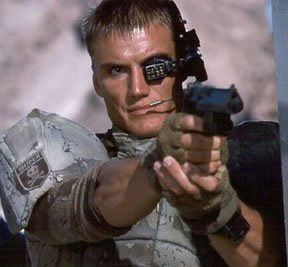
We know Tom Clancy's Ghost Recon: Future Soldier is going to come out some day. We're even reasonably sure it will come out sometime next year. Possibly around "Q1, 2012." But where does that leave the long-promised multiplayer beta, which was once scheduled for this summer, but has seemingly fallen into the perilous oblivion that sits between "this summer" and "Q1, 2012?"
Well, according to Ubisoft's Twitter feed, the darkness of oblivion has lifted, and you'll be able to get your multiplayer Future Soldier on this coming January.
VG24/7 separately confirmed that the beta remains exclusively for Xbox 360 players, and that anyone who picked up a copy of Splinter Cell: Conviction way back in the barely remembered past of 2010 will still have access to the beta. In fact, they'll even get "early, exclusive access."
While we still lack a completely solid release date for Future Soldier, signs now seem to point toward "after January, 2012." And slowly, the puzzle begins to take shape...
For the sake of making sure no one is misled by the headline, I went ahead and altered it to hopefully make it less confusing. Though this is technically the first DLC being sold for Portal 2 on Steam as I say at the beginning of the article, it's not Valve-produced. Last thing I'd ever want to do is confuse anyone, hence the adjustment. Hopefully this all fits together a little better now.
Portal 2 fans have been eagerly awaiting the promised free DLC from Valve since the game's release. Today, there is DLC for Portal 2, but it's not free, and it's not from Valve.

Rather, it's a pack of ten levels developed by Sixense Studios, a collective of motion-sensing evangelists that have partnered with peripheral controller maker Razer to develop the Hydra motion controller. The controller, which vaguely resembles a pair of Wii Nunchuks strung to something that looks like it should be hanging from the ceiling of a Borg cube, is required in order to play these new levels. The good news? It'll only cost you $140! Oh, wait, that's actually the terrible news. The good news is... wait, is there even good news here?
Oh, maybe it's that the levels themselves actually sound pretty cool. Using the Hydra controller, these levels let you do some pretty bananas stuff, like rotate portals and rescale objects, such as custom weighted test cubes. No, that's actually more of a terrible tease than good news. Hmmm.
Could it be that you can buy the hardware directly from Steam, provided you live in North America? Well, I guess that's good news for North Americans, sort of. As for Europeans, you'll be paying 140 Euros, and have to buy it directly from Razer's website. You'll still get the Portal 2 content, though you might have to skimp out on paying your electric bill this month.
Okay, so none of this is really good news. We'll just go ahead and resume our tireless vigil awaiting Valve's first official DLC release. It's gotta be coming soon, right? It's just gotta be...
Source:Rock, Paper, Shotgun
@ZGoon:Thank you, Grammar Man! I am thanking of you for many much good writings!
When I first met Vander Caballero, I was immediately struck by his infectiously positive attitude. By the time I caught up with him midway through day two of E3 2011, most people trudging around the West Hall of the LA Convention Center stood slump-shouldered and somber-faced, exhausted by the grind of the show. Caballero had no such air about him.

He bounded up to the kiosk in the Sony booth where I was waiting for him, and did so with a kind of energy I didn't think could exist by this point at E3. As we began talking, I could sense a bit of weariness in his voice, which certainly made sense given the rigors of E3. But the smile hardly left his face during the entire course of our conversation. This was a man who seemed truly excited to be where he was at that very moment.
He had good reason for such enthusiasm, as Papo & Yo, his newly-announced PlayStation Network project, was making its playable debut. The game is the first project from Minority Media, the independent studio that Caballero helped found in Montreal, Quebec. For any independent developer, it can be an exciting experience to finally show to the world the thing you've poured months, or even years of time and effort into. But in the case of Caballero, it's not just his time and effort he's dedicated to this project, as the story of Papo & Yo is meant to be a metaphor for his own troubled childhood.
The game features a young South American boy named Quico, along with his two friends, a small robot named Lula, and a pink rhinoceros-looking creature known as "Monster," who has an unhealthy addiction to eating frogs. Quico's relationship with Monster is meant to echo that of Caballero and his father, who throughout his life suffered from alcohol and drug dependency. Like the Monster in the game, Caballero's father had two sides: a loving, friendly side, and a monstrous, evil one. In effect, Caballero is pouring the very essence of his life's experience into this game, while trying to turn a very tough story into something fun and engaging for a wide variety of players. No easy feat, to be sure.
What I've played of the resulting game is a fascinating combination of wordless storytelling and third-person, puzzle-based platforming. Quico moves through an imaginary world that feels loosely based in reality. You see mountains, favelas, and other elements of South American landscapes you'd expect, but that world can be manipulated. Chalk drawings on various structures can be played with to reveal new paths, or allow Quico to literally transport buildings and other obstacles that would normally seem immovable. What I played of the game at E3 seemed extremely promising, despite the game's relatively early state of development (the game won't release on PSN until next year).
In talking to Caballero, I found myself less interested in the usual mechanic-and-multiplayer-focused questions one tends to ask during these sorts of events, and more interested in the inspirations behind Papo & Yo's creation. I wanted to know what would inspire a developer who had spent years working on successful franchises at EA Montreal to start his own company and create such an unusually personal video game experience. Thankfully, Caballero was more than happy to oblige, talking with the kind of openness that you really only tend to find in someone who is truly independent, and truly doing exactly what they want to be doing.
== TEASER ==Giant Bomb: You don't often hear game designers specifically reference or talk about personal experiences when describing inspiration for their games, let alone personal trauma. What led you to the point where you decided that you wanted to make a game about something so specifically personal?
Vander Caballero: It was my love for games, I think. When I was a kid and going through difficult times, games actually saved me. It was the only space where I could be in control and... experience safety, and predictability in a way. Everything outside was crazy.
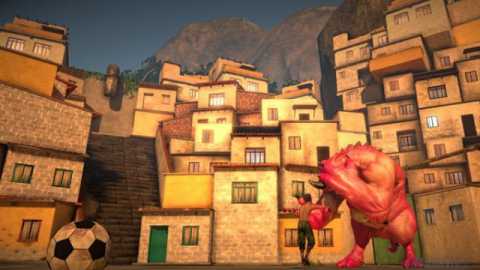
I was a director for Army of Two, I worked on Need for Speed, I worked on FIFA, all these major EA franchises. I learned how to make really high quality games with them, but this was my opportunity to jump out and tell my story. We all want to tell our stories. The difficult part is finding the right metaphor. I had a mentor, Nilo Rodis, who worked on Star Wars, and has worked with Pixar. He taught me a lot about how you have to find the right metaphor to tell your story and not freak people out. And I think that the magic part that we have to learn in this industry, is how we have to find these metaphors that are meaningful to bring the real human story out there. It's really hard, but I've learned, and I hope I can do this many times!
GB: Is the specific story of Papo & Yo a metaphor you've always had in the back of your head? Or did it only come to you recently?
VC: First, you have to work on yourself and understand your emotions inside. They say you cannot bring someone where you have not been, so first you have to go there, come back a better man, and then you can bring people with you. Once you've done that, then you can say, "Okay, what's the metaphor I'm going to use, and then how am I going to make this truthful to games?" Because, it's about telling your story through a simulation, and you have to use simulation rules to tell the story. And that can be really hard. It requires a lot of know-how, it requires a lot of systems, it requires a lot of experience and failure to get there, so it took me a long time to figure that out.
I don't want to make a game where you just say, "Oh, I'll put a cinematic there," because it doesn't work that way. I want people to feel it and finally when you get there, and you see the Monster angry... we're not actually showing it here, but we have it at the office, we've been testing it with people, and when the Monster becomes angry, you see right away that people change, the complete feel of the game changes, and you are performing in a different way. It's a beautiful way to see it.
One thing... in order to take away the Monster's anger, you can give him a fruit. Every time people were taking the fruit and giving it to the Monster and he became normal again, I was like, *sigh of relief*. It moved everyone, even myself. When you have a person who is addicted, you always want to save them. You always want to try to save them. But you actually can't.
GB: Was that your experience? Did you spend a lot of time growing up trying to save your father?
VC: Oh yeah, all the time. You always try to find a way, but you can't. You're just a kid.
GB: One of the things I noticed when playing the game was that there aren't really any other human characters around, it seems. You had said before that you had felt very alone in your situation growing up. Is Quico's world specifically representative of that feeling?
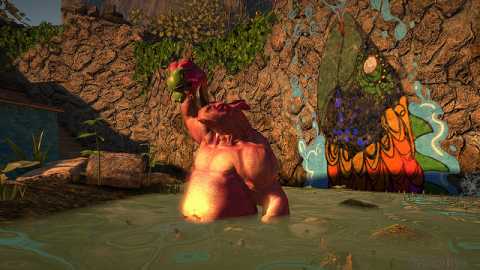
VC: Right now what you're seeing is the imaginary world that Quico created to protect himself from the outside, and once in a while there's a kid who appears here and there and does drawings to transform the world [referring to the sketch drawings related to the game's puzzles]. And that is what the game is, it's about how you transform the world around you and make it magical. But in your game in the story, you're going to get some flashbacks. You're going to go back to another time... and then you're going to go back again... that's all I'm going to say, I won't tell you more about that yet.
GB: Creating a game around a subject like addiction, even in whimsical, metaphorical fashion, can be a dicey subject, given how dark the subject matter is. Was crafting the right tone for the game a difficult challenge for you?
VC: I got the chance to work with Nilo, and he gave me a lot of advice on how to do that. Pixar does that in amazing ways. If you remember Finding Nemo? What a terrible story! Five minutes into the story, you lose your mom, you lose your brothers. Ten minutes into the story, you're lost. But they are able to bring these really heavy stories and immerse you in them, without making you feel afraid. That's what I want to do.
GB: Do you feel like you have achieved that balance? That this is the sort of game that accurately captures your story, while still being a fun, accessible experience that anyone could to pick up and play?
VC: Oh yes. The only thing I could say that perhaps is a flaw in the game is that it's in third-person. And third-person limits the amount of people who are going to play it. I would love for more people to play it, but I love third-person games! So that's the only thing maybe is that it might be hard for people who don't know how to play third-person games.
GB: Has creating Papo & Yo been a therapeutic experience for you?
VC: It's great, and scary at the same time. Because after I do this game I don't know what I'm going to do! So I have to get through this one and I don't know... but it's been really great, and really liberating. The best thing of all is seeing people who actually enjoy and appreciate the story, because it's an honest story. You know, like, I cannot see another shooter. They're so detached, there's no emotion, there's no personal story, there's no growth.
GB: Do you have children of your own?
VC: Yes, I have a child. He's two years old.
GB: I ask because I recently came across the story of another Canadian developer named Ryan Creighton who actually involved his child in the making of a game that she helped design. It was a flash-based game called Sissy's Magical Ponycorn Adventure, and she drew all the art and did all the voice acting for it. Creighton wrote a blog about how much she loved working on it with him. Did you hear about any this?
VC: I had not heard about this! You know, when I did the first prototype, I asked my nieces (my child is still too young), to draw the icons and everything I put it in the game. That's something in the game that's going to happen later on. We didn't have time to input that exact childish... view into the world, but we had it in the prototype and it was really successful.
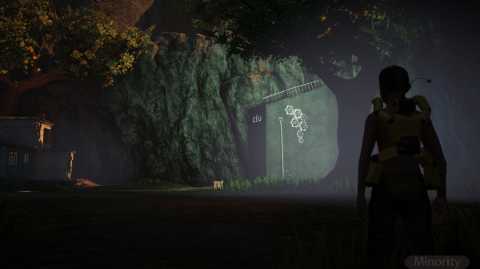
GB: One of Creighton's quotes about the experience of making that project with his daughter was that "Our goal as parents is to give our kids the kind of childhood we would kill to have had." Do you feel like this game is an extension of that notion? In creating this game, do you feel like you're making something to help your own children understand how you grew up, and how to face such a challenging situation?
VC: I think it's right. We always want to give our children the childhood we didn't have. But, it's also crucial to pass your learning on to your children. So when I was a kid I was playing Nintendo, it was more about things being "good" or "bad." You're Mario, and the rest are evil. Life is not like that. What I want to do in the game, your Monster is your friend, you're going to love him, but he can also turn bad. He can be evil. That's what I want. I want a kid playing this game to get a little more out of it, to gain more satisfaction and growth than they otherwise would. That's my goal.
GB: In your PlayStation blog announcement, you actually mentioned Shigeru Miyamoto as a big influence on you as a designer. Is there anyone else in the game industry you can cite as a particular person of influence on your sensibilities as a designer?
VC:Fumito Ueda. ICO was a great inspiration for me. They told a beautiful story, a deep story, and they did it with mechanics. I learned a lot from that, how I can tell my story with mechanics.
GB: What is the one thing for anyone playing Papo & Yo that you most want them to take away from the experience?
VC:*grins* That you can get a beautiful experience that is not a shooter.
When it comes to remarkable candor and a self-effacing willingness to just tell the world whatever the hell happens to be on his mind, few game designers can rival David Jaffe. The man is a veritable fount of unfiltered viewpoints, some of which result in lengthy Twitter expositions on everything from reviews of Calling All Cars to his fondness for Selena Gomez. Other times, this lack of filter can manifest in the form of hours-long E3 podcasts, which somehow morph into absurdly detailed group therapy sessions, of sorts.

It's a refreshing thing to see from a developer, or at least it would be if he weren't just so soul-crushingly down all of the time. Take his most recent remarks to Eurogamer during E3. When asked about the possibility of a Vita version of his upcoming Twisted Metal reboot, given the recent announcements of Vita versions of other big Sony franchises like Uncharted, WipeOut,LittleBigPlanet, and Killzone, Jaffe stated he had no idea whether one would happen or not, citing no current interest from Sony.
"They haven't yet," he admitted. "Nobody has talked to us, so it's not like 'I can't talk about that' – that's usually what you say when it's in development. Nobody has talked to us."
This evidently set Jaffe off on one of his trademark tangents about Twisted Metal, and how it figures into Sony's longer-term plans.
== TEASER =="When you say 'their big franchises' – I don't know – there are probably people within Sony who look at Twisted Metal and say 'that's a big franchise'. I just met a great sales guy from Australia who came up to me and said how he couldn't wait to promote the game down there.
"There are guys who get it, but there are just as many other people who go 'I don't really get it – is this something we really want to be promoting at the same level as say, Uncharted 3?'
One thing you almost never, ever hear from developers is how their titles compare in terms of marketing and promotion compared with other titles by the same publisher. It's just not done, because there often seems to be an overarching fear of looking insolent or ungrateful to their publishing overlords.
Jaffe sounded even more unsure of things when discussing how Twisted Metal might fare at retail.
"I don't know how this is going to do," he continued. "I don't know whether in 2011 there'll still be a big enough home for us to say 'make another one' or 'make one for the Vita'. We're just stepping back and asking 'we've had a lot of love from the fans, but is that going to translate well beyond break even?' Or are we barely going to cross the threshold of making our money back?"
Most people who have seen Twisted Metal seem to have come away with generally positive impressions, but Jaffe's own question about its place in the world in 2011, alongside the car combat genre in general, has been echoed by others, including our own staff during our E3 live discussions.
Whatever the future holds for the franchise, we'll just keep hoping the future stays bright for David Jaffe. The industry could use a few more personalities like him, if only to once in a while remind us that actual human beings make these things, the kind with real doubts, fears, and anxieties about the products they make and the companies they work with. Never change, Mr. Jaffe. Never change.

Log in to comment